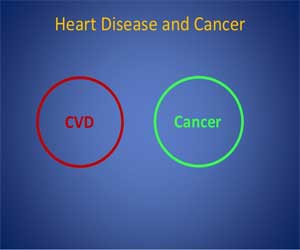- Home
- Editorial
- News
- Practice Guidelines
- Anesthesiology Guidelines
- Cancer Guidelines
- Cardiac Sciences Guidelines
- Critical Care Guidelines
- Dentistry Guidelines
- Dermatology Guidelines
- Diabetes and Endo Guidelines
- Diagnostics Guidelines
- ENT Guidelines
- Featured Practice Guidelines
- Gastroenterology Guidelines
- Geriatrics Guidelines
- Medicine Guidelines
- Nephrology Guidelines
- Neurosciences Guidelines
- Obs and Gynae Guidelines
- Ophthalmology Guidelines
- Orthopaedics Guidelines
- Paediatrics Guidelines
- Psychiatry Guidelines
- Pulmonology Guidelines
- Radiology Guidelines
- Surgery Guidelines
- Urology Guidelines
Lifestyle changes for Heart Diseases decrease death risk in cancer survivors also: AHA

USA: Two medical conditions one is scared of are Heart disease and cancer. They are the leading causes of morbidity and mortality and may coexist. In addition to this certain cancer treatments like drugs, radiation or other treatments can be cardiotoxic while others increase the risk of heart disease in survivors indirectly by increasing weight gain or loss of fitness.
According to the American Heart AssociationCardiac rehabilitation program decreases death risk in cancer survivors also. Cardiac rehabilitation often involves exercise training, emotional support and education about lifestyle changes to reduce your heart disease risk, such as eating a heart-healthy diet, keeping a healthy weight and quitting smoking.
The American Heart Association (AHA) released a scientific statement introducing the concept of cardio-oncology rehabilitation that is meant to tackle the cardiovascular-related problems that arise in cancer survivors and patients. The program provides structured exercise and ancillary services to mitigate cardiovascular disease risk in this population.
The statement, published in the journal Circulation also discuss the need for future research to fully implement a multimodal model of cardiac rehabilitation for patients with cancer and to determine whether reimbursement of these services is clinically warranted.
Cancer and heart disease are two leading killers across the world are in some ways intertwined. Certain cancer therapies, including radiation therapy and some types of chemotherapies, are associated with increased risk of cardiovascular disease (CVD) and events.
AHA released this statement to counteract those cardiovascular risks in cancer patients, which is similar to cardiac rehab plan followed by heart attack survivors.
Also Read: Thyroid cancer survivors at higher risk of developing CVD
Owing to advances in early detection and treatment, the number of cancer survivors is increasing. But many die from a cardiovascular-related event compared to someone who has never had cancer. Cancer survivors also are 1.7 to 18.5 times more likely to develop diabetes, high blood pressure, high cholesterol or other heart disease risks.
"There are still cancer patients and health care providers who don't understand the link between heart disease and cancer, so we're trying to educate them," said Dr. Susan Gilchrist, chair of the statement's writing committee and a cardiologist at the University of Texas MD Anderson Cancer Center in Houston, said in a press release.
The new report explains how certain factors – such as a patient's age, the type of cancer and whether chemotherapy was involved – can make a difference in a person's risk for cardiovascular disease, she said.
"We need to do a better job of explaining the issue, and I think this document helps people understand who's at higher risk and, if they are at higher risk, what can we do about it as both oncologists and cardiologists so we don't keep separate silos," Gilchrist said.
Also Read: Testicular Cancer Survivors at long term heart disease risk
The reasons attributed to increased cardiovascular risks could be many. Some people already may have cardiovascular risk factors, but not know about them at the time of their cancer diagnosis or during treatment. Also, the heart muscle is weakened by the drugs, radiation or other treatments used to eliminate cancer.
Other times, the heart muscle is weakened by the drugs, radiation or other treatments used to eliminate cancer.
"Many patients, after they receive their cancer therapy, need help to get their heart back to a stronger and healthier functional status," said Dr Randal Thomas, a member of the statement's writing committee.
The statement also calls for more research to show cardio-oncology rehabilitation works. Past studies have shown exercise may help people regain some of the cardiorespiratory fitness lost during cancer treatment. Research also suggests programs modelled after cardiac rehab can improve a survivor's muscular strength and quality of life.
"There's definitely a need for more studies to look at new populations and methods and when is the best time to initiate therapy," said Thomas, medical director of the cardiac rehabilitation program at the Mayo Clinic in Rochester, Minnesota, where a cardio-oncology rehab program is currently available for breast cancer survivors.
"But at the same time, it's a really good time for patients and health care providers to communicate with policymakers, including government leaders, about the importance of covering what we already know can be beneficial to patients recovering from cancer."
Gilchrist, who heads up one of the nation's few programs in this area, said there's an overlap between cardiovascular disease and factors that drive cancer.
"Cardiac rehab is about getting people to exercise more. We know exercise helps people live longer. It keeps people out of the hospital. It lowers the risk of cancer mortality for several types of cancer. It also prevents cardiovascular disease," she said. "So providing structured exercise to cancer patients, systematically across the U.S., would be a tremendous win for society in general."

Disclaimer: This site is primarily intended for healthcare professionals. Any content/information on this website does not replace the advice of medical and/or health professionals and should not be construed as medical/diagnostic advice/endorsement or prescription. Use of this site is subject to our terms of use, privacy policy, advertisement policy. © 2020 Minerva Medical Treatment Pvt Ltd